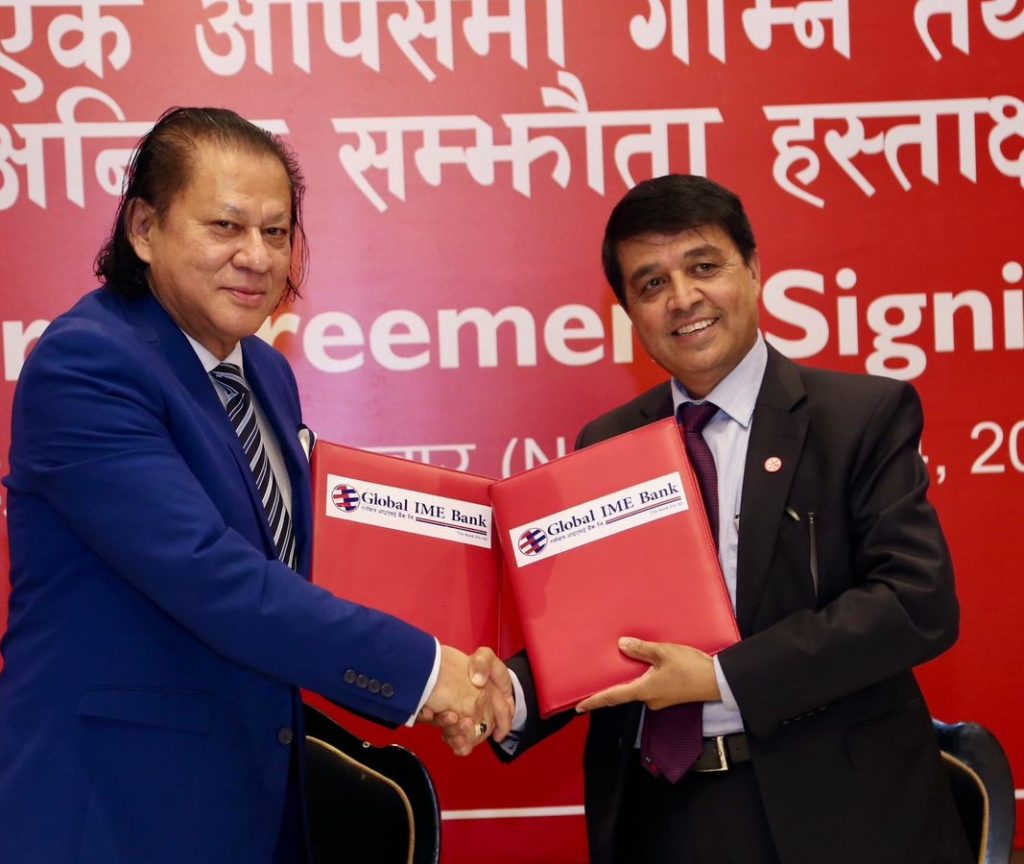KATHMANDU: Global IME Bank Ltd and Bank of Kathmandu Ltd signed the final memorandum of understanding on Monday to merge with each other.
The memorandum of understanding was signed today in Kathmandu by Global IME Bank Chairman Chandra Prasad Dhakal and Bank of Kathmandu Limited Chairman Prakash Shrestha.
Previously, the boards of directors of both banks approved a 1:1 share swap ratio based on the appraiser’s evaluation report of movable/immovable assets, liabilities, and transactions for the purpose of merging Global IME Bank Limited and Bank of Kathmandu Limited.
Following the merger, the bank’s total capital will be Rs. 57 billion, its paid-up capital will be Rs. 35.77 billion, its total deposits will be Rs. 400 billion, and its total debt will be Rs. 379 billion. The new bank formed as a result of the merger will be Nepal’s largest bank in terms of total assets, paid-up capital, and business size.
The new bank’s name will be Global IME BOK Limited, and its Board of Directors will include Chairman Chandra Prasad Dhakal on behalf of Global IME Bank and two people on behalf of Bank of Kathmandu. Similarly, Global IME Bank’s Chief Executive Officer, Ratnaraj Bajracharya, will continue in his position.
Global IME BOK Limited, which will be created by joining 21 banks and financial institutions, which includes five commercial banks, 10 development banks, and six finance companies.
Additionally, through the end of October, both banks had generated a net profit of more than 1.47 billion rupees.
After the two banks merge, Global IME BOK Limited will have 385 branch offices, 367 ATMs, 275 branchless banking services, 61 extended branch offices, 3 foreign contact offices, more than 4 million customers, and many other financial indicators, making it the largest bank in the nation.
The Global IME BOK banks stated that following the merger of the two banks, the bank believes that the organization’s capital, work area, and work capacity will increase, and the bank will establish itself as the strongest and most capable bank in the financial market, providing more excellent services and facilities to customers while providing the highest returns to investors.
The presidents of the bank’s board of directors spoke at the signing ceremony and reaffirmed their shared commitment to the bank’s ability to create new financial opportunities and to consider the interests of all parties with a direct or indirect connection to the bank.
Global IME Bank Chairman Dhakal stated that the banking sector will be developed in accordance with the needs of the country. He stated that large and powerful banks will be required to invest in large infrastructures, provide financial access throughout the country, and reduce banking costs, and that the bank formed as a result of the merger will address this.
He stated that the final memorandum of understanding for this merger was signed in accordance with the statement that Global IME Bank is always the first to follow the orders given by the Government of Nepal and Nepal Rastra Bank.
Additionally, he pledged to make the newly created bank, which would result from the merger, the best bank possible in every way, not just in terms of size.
The bank has acquired its current status by working in the interest of the regulatory body and the bank rather than with the purpose of becoming number one, he claimed, adding that the new bank that will be formed following the merger will be number one in all parameters.
The role of banks and other financial institutions would be crucial to the country’s economic growth and prosperity, according to Bank of Kathmandu Chairman Shrestha.
“A large, capable, and good bank is required for the country’s economic transformation and prosperity. The Global IME BOK, which will be formed following the merger, will address it,” he stated.
He expressed his belief that the new bank formed as a result of the merger will be a huge success in Nepal’s banking sector.
In the program, the presidents of both banks expressed their heartfelt gratitude to the government of Nepal, Nepal Rastra Bank, bank directors, shareholders, employees, the media sector, and other well-wishers who assisted in the merger/merger process, either directly or indirectly.
Radhesh Pant, the joint merger committee’s coordinator, stated that the merger committee works with investors, employees, and the entire bank at the center, and that only a large bank can provide sustainable and high returns.
Both banks initially agreed to merge on an equal footing on June 16. The merger agreement was reached after the Nepal Rastra Bank announced that it would not provide any facility if the banks did not sign a merger agreement by mid-July 2022.

